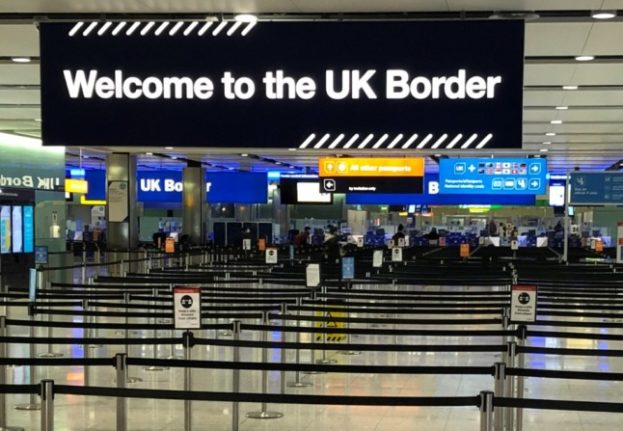For many people, crossing borders might be about holidays, but for people living abroad travel is vital to see loved ones – something that has been very difficult over the last 18 months.
Brits living in France have faced the prospect of a 10-day quarantine and paying at least £160 per person for testing if they want to travel to the UK, which has made the trip impractical or unaffordable for many.
READ ALSO Everything you need to know about travel between France and the UK
So the news that the UK was lifting its quarantine for vaccinated travellers from July 19th came as a great relief – until it was revealed that this only applies to people vaccinated in the UK.
For Normandy resident Tina Abbott this devastating realisation means that she still cannot travel to the UK to say goodbye to her dying father.
She said: “I was so happy when I heard the quarantine was being lifted, I had my finger on the button to book the ferry, and then my husband said it was for UK residents only – I’m devastated.
“My dad is very poorly with a host of illnesses and the hospice have told us that it is a matter of weeks now.
“But if I go I have to quarantine for 10 days – I don’t have a home in the UK so I will need to pay for a hotel and then pay £160 for testing, or £300 if we want to shorten the quarantine to five days, so £600 for me and my husband.
“Realistically I know that we will also have to do the journey again in a few weeks for the funeral and I just can’t afford it. I work as an English teacher so I can’t work remotely and my husband is a heating engineer so he can’t work from quarantine either.
“I just want to go and say goodbye.”
From July 19th, Brits who fancy a holiday in countries including France will not have to quarantine on their return, but thousands of Brits like Tina who live in France will still be subject to quarantine and testing rules.
She said: “It’s a disgrace, I’m fully vaccinated with Moderna – that’s a vaccine that is used in the UK, in fact mine probably came out of the same factory, so why are we being treated differently?”
The problem is that the UK government will only accept NHS paperwork as proof of vaccination, despite the NHS certificates and NHS app being accepted as proof of vaccinated status in France.
Tina’s story was echoed by many other Brits living in France who want to travel.
Katherine, 39, who lives in Paris, said: “I haven’t seen my family for 18 months, my parents are both elderly so I wanted to wait until both they and I are fully vaccinated.
“I’ve had a double dose of Pfizer now but still the UK government says I have to quarantine for 10 days and pay a fortune for those travel tests – which are just extortionate. I can’t afford the money.”
My mum is 85, I haven’t seen her since 2019. I am double Pfizer dosed, UK passport holder. Why would I have to quarantine @grantshapps ? Is the answer about the economy?
— Robin DoubleVaxxed&StayingMasked (@RobinMSanderson) July 8, 2021
I literally can’t get over this – I haven’t seen my family since May 2020 and live 2.5hrs away. It’s totally nuts, there is no logic… 😭😭😭
— Marissa Cox (@ruerodier) July 9, 2021
This is absolutely spiteful, preposterous & awful. The UK has the highest rates again in Europe yet the UK Govt is using the Brexit politics and popular vote sway. I haven’t seen my family since March 19 – yet EUFA officials can enter – yet I can’t come home. Words fail me
— Kevin Lucas (@KevinLucas26) July 8, 2021
The citizens’ rights group British in Europe has written to the UK government calling on them to overturn their “epidemiologically illiterate” policy which discriminates against UK citizens living abroad who had their vaccines in their country of residence.
A spokesman for the group said: “It would appear that yet again British citizens abroad are at best an afterthought, not considered at all, or at worst now caught up in the endless disagreements between the UK government and the EU.”
The British government says it hopes to have a further announcement on these issues by the end of July.
Transport minister Grant Shapps told Sky news that it was being discussed, although in the same interview he appeared to be unaware that the EU’s digital health passport scheme is already up and running.
Thank you @SkyNews and @skynewsniall.
I would just point out that with the EU's vaccination passport we can also "very easily" prove our vaccine status.https://t.co/DNHU6tZ8Is— Kim Willsher (@kimwillsher1) July 9, 2021
We will update our Travelling to France section as soon as there is any news on this issue.



 Please whitelist us to continue reading.
Please whitelist us to continue reading.
Why do we feel that we are PENALISED by the British government for choosing to live in France ? We are disenfranchised, having lived here for more than 15 years; we are prevented from saving in an ISA or contributing to a pension fund or applying for a new credit card; (why ? Is it not government policy to encourage people to save for their retirement ?). Brexit has made things worse, and now this ridiculous refusal to recognise vaccinations done in France is making it impossible for us to consider a visit to the UK to see our family. Yet in spite of all this, the British government still expect us to pay taxes to them. It is outrageous and I am tempted to refuse to pay any more taxes until these issues are resolved.
We have lived in France for 19 years, are both fully vaccinated with the Pfizer vaccine. We have been told that the vaccine can’t be recognised in the UK, because of difficulties with the technology. Is this true?